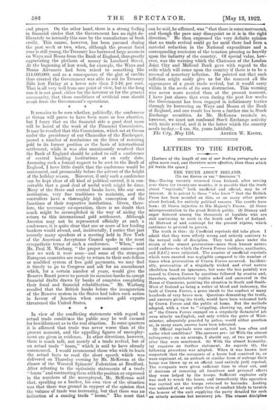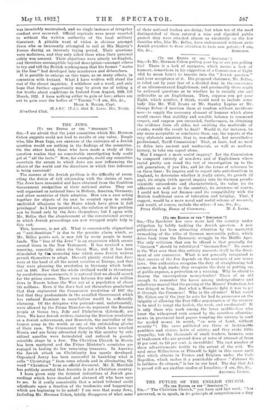LETTERS TO THE EDITOR.
[Letters of the length of one of our leading paragraphs are often more read, and therefore more effective, than those which fill treble the space.]
TILE TRUTH ABOUT IRELAND. [To THE EDITOR OF THE " SPECTATOR."1 Sin,—Having recently returned from Ireland, after serving over there for twenty-one months, it is possible that the truth about "reprisals," both unofficial and official, may be of interest. It is patent to those "who know" that the British Press has been muzzled on this, as on many other points about Ireland, for entirely political reasons. The results have been: (1) Grave injustice to His Majesty's Forces. (2) Gross misrepresentation to the great British public. (3) Dismay and anger fostered among the thousands of loyalists who are still continuing to exist in the South and West of Ireland. (4) Distrust of and contempt for the present regime, which continues to pretend to govern.
The truth is this: (1) Unofficial reprisals did take place. I admit that they were utterly wrong and entirely contrary to the normal code of discipline. They took place under the strain of the utmost provocation—more than human nature could endure—to which the Crown Forces (soldiers, auxiliaries, and R.I.C.) were subjected. The number of unofficial reprisals which were enacted was negligible compared to the number of times when provocation of Crown Forces occurred. Incident- ally, provocation of a singularly wicked and cruel nature (doubtless based on ignorance, but none the less painful) was caused to Crown Forces by questions followed by evasive and, therefore, unsatisfactory replies asked and answered in the House of Commons, painting the situation in South and South- West of Ireland as being a welter of blood and indecency, the fault of Crown Forces, a gross insult to the conduct of many hundreds of very brave men. Questions demanding the truth, and answers giving the truth, would have been welcomed both by Crown Forces and the public at home. But the methods adopted, with a view to " crippling, showing up, and getting at" the Crown Forces engaged on a singularly distasteful job were utterly un-English, and only within the gates of West- minster, adequately guarded by police, would either question or, in many cases, answer have been tolerated. (2) Official reprisals were carried out, but how often and under what conditions? The answers are: (a) With the utmost infrequency; on an average, I should say, of two per month after they were sanctioned. (b) With the utmost humanity. (a) requires no further statement. As regards (b), the following procedure was adopted. When it was known (not suspected) that the occupants of a house had connived in, or were cognisant of, an ambush or similar form of outrage their, house was blown up as an official (and entirely just) reprisal. The occupants were given sufficient time to clear out, and if desirous of removing all furniture and personal effects they were helped by the troops. Sufficient explosive only was used to wreck the house, and immediately this operation was carried out the troops returned to barracks. Looting was unheard of, or any other form of conduct likely to tarnish the honour of the unit supplying the party detailed for such an utterly noisome but necessary job. The utmost discipline
was invariably maintained, and no single instance of irregular conduct ever occurred. Official reprisals were never resorted to without the written authority of the local military Governor. A pitiable Want. of vision is obvious amongst those who so incessantly attempted to rail at His Majesty's Forces during an intensely trying period. Their questions were malicious, and they only asked them when their personal safety was assured. Their objections were utterly un-English, and therefore contemptible beyond description—amongst others to try and tell the British working-man that his former " mates in the line" had developed into murderers and debauchees.
It is possible to enlarge on this topic, as on many others, in connexion with Ireland. What I have written will stand the test of the closest inquiries. I withdraw not a word, and only hope that further opportunity may be given me of telling a few truths about conditions in Ireland from August, 1920, till March, 1922. I have nothing either to gain or lose; others are out to gain over the bodies of " Tommy."—I am, Sir, &c.,
HUGH A. BULLER, Capt.
(R.A.S.C. (T.A.), 42nd E. Lancs. Div. Train). Stratford Club.



































 Previous page
Previous page